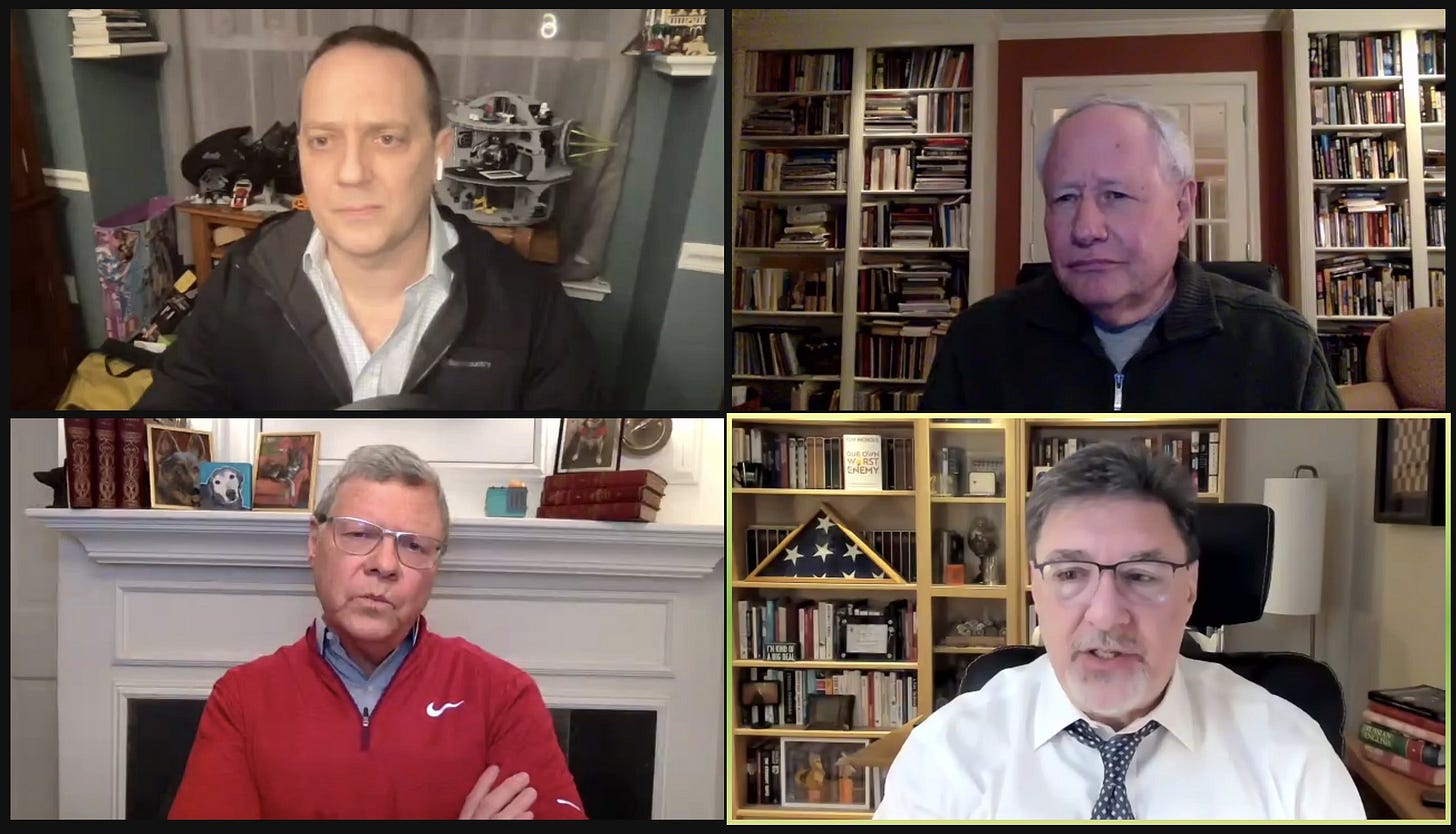Recently at The Bulwark:
SONNY BUNCH: Jack Palance Vs. Vladimir Putin and Steven Soderbergh's 'Kimi' and the Modern Thriller 🔐 and ‘Studio 666’ Review.
CHARLIE SYKES: The Massive Gap in Biden's Sanctions 🔐
JVL: No One Is in Control.
You can support The Bulwark by subscribing to Bulwark+ or just by sharing this newsletter with someone you think would value it.
THEODORE R. JOHNSON: Ketanji Brown Jackson Is Next. History is made at the high court:
Brown Jackson’s pedigree is clearly the stuff of a Supreme Court justice-in-the-making. She is a graduate of Harvard College and Harvard Law, clerked for Justice Stephen Breyer (the man she will replace, if successfully confirmed), and has held positions in the executive branch and private practice. But one detour stands out: Brown Jackson spent two years as a public defender—which is, as SCOTUS blog points out, atypical for justices, but similar to the background of the man whose mantle she would likely take up, Thurgood Marshall.
The national stage that Supreme Court hearings offer will almost certainly lead to a few contentious exchanges between Brown Jackson and Republican senators. One aspect of her judicial decisions that may attract special attention are her rulings concerning the Trump administration, such as when she ruled Trump’s former White House counsel Don McGahn would be required to testify before the House committee investigating Russian interference in the 2016 election. But perhaps of even more interest will be that she did not believe Trump’s claim of executive privilege covered his removal of classified documents from the White House and joined the Circuit Court’s opinion that Trump would need to turn over those records. A few Republican senators may focus on these cases to signal fealty to the former president.
But amid all the debates about Brown Jackson’s record, her judicial philosophy, and the politics and political theater that will certainly attend her nomination and confirmation hearing, the nation would do well to pause and appreciate this historic moment.
Eric and Eliot discuss Putin’s illegal war of aggression against Ukraine, what Eliot heard at the Munich Security Conference and in Poland last week, as well as what the West’s theory of victory should be in the conflict over Ukraine, and how should the U.S. and the West more broadly sounds treat Russia now that it has become a pariah state.
While CPAC is mocking, meme-ing and owning the libs, a different summit —one for principled conservatives — is convening this weekend to reconceptualize the movement.
Principles First’s Heath Mayo joins Charlie Sykes on the podcast.
AEI’s Adam White joins the group to consider whether the invasion of Ukraine will shake the U.S. from its decline into imbecility. Also whither the Supreme Court?
Did you miss TNB?
Sorry we missed you, but good news! It was simulcast last night for all to see. Catch up here.
Members of Bulwark+ get TNB each week live on Thursdays, with a members chat section, a Q&A feature, and archived video and podcast copies of the show.
UKRAINE COVERAGE 🇺🇦
AGNIA GRIGAS: Russian Energy Sanctions Cause Short-Term Pain for Long-Term Gain.
Sanctioning Russian gas would not make much of a difference for Americans. In 2018 Russian liquefied natural gas (LNG) made its way to New England during a particularly cold winter and a gas shortage, but today, the United States has a surplus of natural gas and is a major international supplier.
The turmoil in global energy markets has already begun. Global oil jumped above $105 a barrel and European natural gas prices soared more than 40 percent. Other key natural resources, such as gold, aluminum, copper, and nickel, have also increased, as have food prices. (Ukraine is among the world’s largest grain producers, and disruption in its production is likely to have ripple effects in food markets around the globe.)
Unlike Europeans, Americans won’t have to worry about heating their homes. What gives the U.S. consumer and American industry protection is the fact that the United States has emerged in the past 10 years as the world’s top producer fossil fuels (including oil and gas) and a leading LNG exporter. The country has achieved energy independence and is no longer dependent on oil and gas imports as for much for its history. This positions the American citizens much better than their counterparts in Europe who remain vulnerable on imports during volatile markets.
BRIAN STEWART: Putin’s No Madman.
With Ukraine under full-scale assault, a slew of leaders, journalists, and intellectuals in the West have suggested that we are witnessing an act of delusional Russian folly. This chorus alleges that by ordering his military forces to expand the irregular war he has prosecuted against Ukraine since 2014, the Russian dictator has taken leave of his senses.
No less a figure than Prime Minister Boris Johnson has fanned the preposterous doubts about Vladimir Putin’s mental health, claiming that Putin is an “irrational actor” bereft of the ability to calculate risk.
Carl Bildt, the prominent Swedish diplomat and former prime minister, likewise asserted that it would be “insane” for Putin, whose emotions have “overtaken rationality,” to escalate his war on Ukraine.
Former U.S. Ambassador to Russia Michael McFaul, acknowledging that Putin’s war constitutes naked aggression, asserted that it is irrational because it could bring on a disaster in a replay of the Soviet invasion of Afghanistan.
For the sake of a newly imperiled world order, this notion of Putin’s insanity must be promptly discarded before it congeals into conventional wisdom.
PAUL MASSARO: The New Russia Sanctions Are Designed to Hurt
The post-Cold War period is over. What comes next is certain to be a much more troubled and violent age. The question is: How to respond to unprovoked state violence?
The obvious immediate answer is sanctions. The Biden administration promised that a Russian invasion of Ukraine would be met with “swift and severe” sanctions. And very serious sanctions were delivered. The most impressive thing about these sanctions was their multilateral nature. They were coordinated among the G7, creating a grand democratic coalition that confronted Putin together.
After a lackluster showing in the first round of sanctions, the United Kingdom on Thursday sanctioned Russian banks and banned multiple state-owned and state-influenced companies from raising money in the U.K. The U.K. also sanctioned a handful of Kremlin elites and oligarchs—although stopping short of a proper crackdown. Rather, Prime Minister Boris Johnson promised the creation of a new “kleptocracy cell” within the National Crime Agency assigned to investigate and take law enforcement action against oligarchs. The U.K. sanctions also included export controls on dual-use technologies and other specialized items.
TOMÁŠ KLVAŇA: The Real Reasons Putin Feels Threatened by NATO.
Another well-known reason for Putin’s attack is his fear that Ukraine might have evolved into a stable, prosperous democracy and as such would be a role model for the pro-Western democratic opposition in Russia. He acts now based on what to him is a rational calculation of his own interests in his own political survival: He does not want to end up in prison, or even blindfolded standing against a brick wall.
What foreign policy realists do not understand—or do not want to understand—is that even if NATO had not been enlarged to include countries in Central and Eastern Europe, there would be a very good chance that Putin would still behave the way he does today. There would be one difference—his political playground in Central Europe would be larger than it is today. Corruption would be an order of magnitude higher, instability would deter foreign investment, and the living standard of citizens of Warsaw, Prague, Vilnius, Bratislava, and Budapest, which is now close to Western standards (the Czechs are richer than the Spaniards and the Portuguese, and are quickly catching up to the Italians), would have been significantly lower, essentially similar to today’s Ukraine, which never got the chance to integrate with Europe.
🚨OVERTIME 🚨
How can you help Ukraine? That’s what a few have asked me in recent days. I hope to share other resources I can determine are of value and legitimate, but here is what the government of Ukraine says will help:
Matt Labash on “Special Military Operations…” Read and subscribe.
Stop trying to make Ukraine your culture war… At Reason, Elizabeth Nolan Brown writes:
Now is not the time for petty culture war grievances and personal grifts. Yes, life—and news—in America goes on, but maybe the day Russia starts bombing Ukraine isn't the time for your critical race theory rant or your masculinity-crisis paranoia, you know? And it certainly isn't the time for you to try and tie whatever you would be on about anyway into the war news cycle.
Doug Ducey’s Disgrace… This is what happens when your spine disappears and put your future in the party over doing what’s right.
The New Strategic Narcissists… Robert J. Lieber argues: “Sohrab Ahmari, Patrick Deneen, and Gladdin Pappin adopt ‘blame America first’ sentiment from the old Left.”
America’s Largest Inland Port is Running Out of Water… And the solution has Illinois residents divided.
Russia counter-threatens… with the International Space Station.
How COVID stole our time… And how we can get it back.
U.S., EU, Russia, and Ukrainian economics… In two charts. Courtesy of Wells Fargo’s economics team. Read more of their observations here.
That’s it for me. Tech support questions? Email members@thebulwark.com. Questions for me? Respond to this message.
—30—
Editorial photos provided by Getty Images. For full credits, please consult the article.











